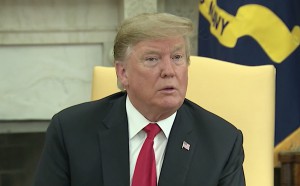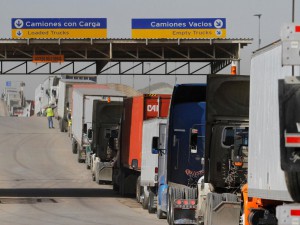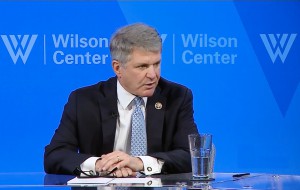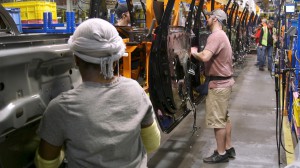
President Donald Trump reiterates that he will close the border, despite the economic impact, if he feels it's necessary.
President Donald Trump is sticking to his guns when it comes to closing the border with Mexico, despite the devastating impact it may have on significant parts of the U.S. economy, particularly the auto industry.
“Sure, it’s going to have a negative impact on the economy. It’s one of the biggest trade deals in the world we’ve just done with the USMCA,” Trump told reporters after a meeting Tuesday.
“It’s a very big trading partner, but to me, trading is very important, the borders are very important, but security is what is most important to me. I have to have security.”
Roughly 37% of the imported parts used on U.S.-made vehicles are imported from Mexico, including critical pieces like the wiring harnesses used on 70% of all vehicles assembled in the States. Disrupting that flow could idle many of the more than 1 million employees at U.S. auto assembly and parts plants.
(Suppliers, dealers express concern about stability of the industry. Click Here for the story.)
“It would be a major disruption” if a border shutdown were to last more than a couple days, said David Cole, director-emeritus of the Center for Automotive Research.
How long manufacturers could sidestep a border closure would depend, said Cole, “on how much inventory they keep in stock.” But as automakers have migrated to a just-in-time manufacturing process, where most parts arrive at an assembly plants just days, and sometimes even minutes, before they’re needed, there is little to fall back on.

Trucks are already waiting in long lines to cross the U.S.-Mexico border. If it's closed, automakers and suppliers will shut down in short order.
Trump’s reiteration that he loves trade, but not at the cost of security, has auto executives scrambling to revise plans. The impact of a border shutdown, however, could be far more substantial considering the U.S. imported $59.4 billion worth of Mexican-made auto parts last year.
At the same time, American automakers and auto parts manufacturers send $32.5 billion worth of parts and vehicles heading south of the border. All told, that works out to an average of about $250 million worth of automotive goods every single day.
In some instances, automakers would be able to keep their plants running if the parts they would be missing are minor, such as plastic trim. They would have to stockpile the vehicles, however, until the shutdown ended and parts were again made available. But other parts would make it difficult to continue production. Wiring harnesses, for example, are some of the first parts installed on an assembly line.
Were Trump to move in the coming weeks it could hit automakers at a particularly vulnerable time, spring traditionally bringing the industry’s strongest sales. In the meantime, automotive industry observers are keeping a watchful eye on developments.
Matt Blunt, president of the trade group, the American Automotive Policy Council, said that, “Any action that stops commerce at the border would be harmful to the U.S. economy, and in particular, the auto industry. Access to Mexico’s market place and North American integration are critical to operations in the U.S.,” Blunt said in a statement.
(Click Here for more about Trump smacking GM with Lordstown tweets.)
Since NAFTA came into force on Jan. 1, 1994, automakers have broadly integrated their U.S., Mexican and Canadian operations. At the same time, Mexico has evolved from an industry backwater to become one of the world’s largest automotive manufacturers. The NAFTA agreement has contributed to that growth, as have the many other free trade agreements the country has negotiated. Low labor costs are the other contributing factor.
Whether Trump will go ahead with the border closure remains to be seen, reports from the White House indicating some officials are pushing back, warning the president of the potential impact on the U.S. economy. But White House Chief of Staff Mick Mulvaney on Sunday said that heading off that move would require “something dramatic.”
Republican leaders expressed concerned about a possible shutdown, which Senate Majority Leader Mitch McConnell called potentially “catastrophic.” Rep. Michael McCaul (R-Texas), ranking member of the House Foreign Affairs Committee said Monday he did not think President Trump will actually close the southern Border.
“I think he’s doing a lot of this out of frustration. I don’t think he’s going to actually completely shut off the border. It would have a significant impact on our economy.”
However, this latest threat comes at a time when the auto industry is struggling to cope with a variety of other Trump trade moves. That includes the tariffs on imported aluminum and steel that, according to both Ford and General Motors, cost them each about $1 billion last year.

Rep. Michael McCaul (R-Texas) said that he doesn't believe that Trump will close the border and that the president is simply "frustrated."
The president is meanwhile considering several other trade measures. He has until next month, for one thing, to decide whether to follow up with new tariffs on imported cars and car parts. Because of the large number of foreign-made parts used on American assembly lines, the cost could be substantially. Toyota has warned the move could increase the price tag of a Kentucky-made Camry sedan by as much as $1,600.
(To see more about Trump moving to kill EV tax credits, Click Here.)
“There is nothing the auto industry hates more than chaos, which makes it difficult to plan ahead,” said analyst Cole. But when it comes to actions that could impact the auto industry, he added, chaos is the way the administration operates.
Paul A. Eisenstein contributed to this report.

